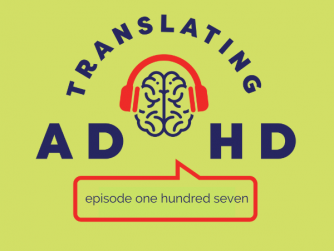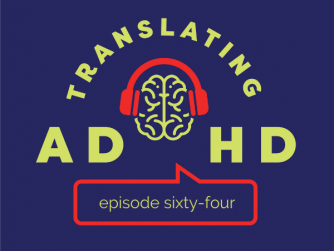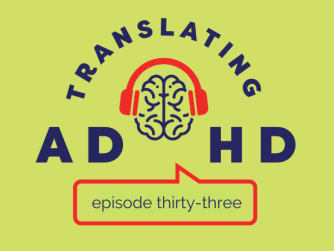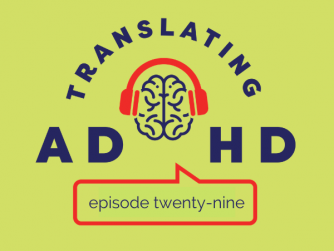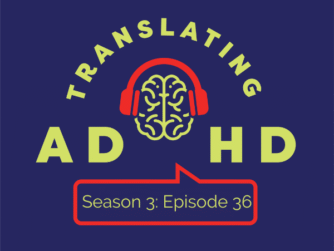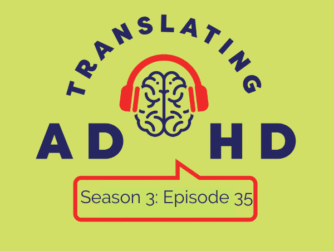Asher and Cam dive deeper into the Adrenaline Response Cycle, exploring the Delay phase that preceeds the Intense Activity phase. Last week they explored the Crash-Recovery phases, so the hosts thought it wise to look at the phase that so many of us with ADHD spend lots of time grappling with. In common circles this is referred to as procrastination, but hosts Cam and Ash prefer to not use this language because it doesn’t get to the root of the dilemma. They share several examples of how Delay can play out from doing everything but the urgent task to doing much more than the specific challenge.
Ash reiterates the distinction between constructive and productive work. Cam shares how our contextual wiring can wreak havoc when fueled by fear and urgency, playing out catastrophic scenarios or taking us to valley moments. Both hosts talk about how pause, disrupt and pivot can be useful during the delay phase and the power of acceptance.
Episode links + resources:
- More on ARC from Cam’s Blog
- Adrenaline Response Cycle (image below)
For more of the Translating ADHD podcast:
- Episode Transcripts: visit TranslatingADHD.com and click on the episode
- Follow us on Twitter: @TranslatingADHD
- Visit the Website: TranslatingADHD.com
Episode Transcript:
[00:00:00] Ash: Hi, I’m Ash [00:00:01] Cam: And I’m depleted. [00:00:04] Ash: And this is Translating ADHD. All right, Cam, you warned me. You warned me… [00:00:11] Cam: I did. I did warn you, Ash. [00:00:13] Ash: And yet that is not what I expected. So say more about depleted and where we’re going today. [00:00:19] Cam: Yeah, I’m depleted and I’m a bit vulnerable. To regressing, to moving backwards, to falling into old habits. Ash, vulnerable to becoming beholden to ARC, right? The ARC way, the adrenaline response cycle that we talked about last week, and its relationship to boundaries. And we thought, what a great time to look at ARC and what to do about it because as we talked about last week, so many of our listeners and clients talk about how ARC resonates with them, and this is synonymous with the ADHD experience is that because we don’t do what we know we ought to do, we grab onto what works, right. And that pony we’ve talked about in episode four, to ride that one pony which is again, hyperfocus urgency, getting things done at the last minute and really beholden to the big signal. [00:01:22] Cam: So I joked about being depleted today, but I really am. I’m depleted, kind of waking up in a different place, and I’m noticing that I’m vulnerable to kind of resorting back to that ARC. And my avoider, as I talked about the week before, you know, sort of in the room. Like, I don’t wanna, I don’t wanna, I got my list. I know exactly what I need to do today. Right? Got that far.But I’m looking at it and it’s not that exciting, Ash. But I think the most important thing, and the thing that matters that we wanna share with our listeners today is, I’m aware, right? Having this awareness of your proximity to ARC, right? That’s the key. I’m aware. And so I’m having to really reinforce my boundaries and take it easy. Maybe not try to bite off too much, but to go easy on myself. And there’s some things here that don’t have to happen today. Most of them don’t have to happen today.
And I have some agency here in my day too. It’s open. But again, just starting with recognizing why I’ve been doing this work for a long, and those tethers back to ARC. They can reinforce or they can kind of reconnect, and my tethers to other areas right around who I am, what I’m trying to do over the long haul to inspiration, to curiosity, to keen observer kind of fade a bit. It is a work in progress, and we’re always working.
But today to really look at, as you said, there’s an opportunity to disrupt, to see how with the big signal we tether to this fight flight center, this negative neural network to get things done. And so if we have awareness of it, we can start to pause, disrupt, and pivot there. And that’s what we’re gonna talk about today. How’s that? Was that good?
[00:03:27] Ash: Yeah, it was good. It was good. Cam, it sounds like we’re in a similar spot right now. [00:03:35] Cam: It is February. [00:03:37] Ash: February’s always tough, particularly a tough time of year for me energy-wise, and I’ve got all of these new signals with my partner living here full-time. [00:03:48] Cam: Oh yeah. [00:03:49] Ash: With the cats, which by the way, my purpose class asked me for a cat update last week. So maybe the rest of the audience would want to know too. We’re no longer air locking. We actually put a cute little cat door in the bedroom door because I do like to sleep with the bedroom door closed and the cats have not killed each other overnight, and that’s been a few nights now that they’ve had full access, both of them, all night long.And as a bonus, the cat that was previously closed in the bedroom with us at night is the yeller and had cultivated this habit of yelling at nothing for about an hour, starting at about 6:30 in the morning. And she might still be doing that, but gratefully not in the bedroom anymore. So, I think it’s important for our listeners and our clients to see and to know that you and I are still doing this work. It’s never done.
But going back to that awareness piece, the thing I love about ARC, Cam, is it gives language and makes sense of a cycle that we find ourselves in as ADHD people. It’s one of the most popular topics in terms of when we ask people what’s resonating about the show, that early ARC episode. And the reason for that is it creates a point of awareness, and when we are aware there’s an opportunity to have a different experience. And listeners, that’s kind of where the rubber meets the road because Cam having a different experience looks different than me having a different experience, even though we’re prone to this same ARC cycle.
[00:05:39] Cam: There’s also this other thing that’s happening here, is that can have urgency around this whole urgency thing, right? We come to this new awareness, and it’s like, oh my God, you know, I do this. I can’t believe it. I see myself in this picture, and I don’t like it. And we try to use ARC to get some distance from ARC. Right. Listeners, how many of you have done that? Sort of like, Ooh, I don’t like that. I don’t like this behavior. But then all we know take action or what we rely on 85, 90% of the time is this react and respond to something. So this is where this pause, disrupt, pivot, can be so useful as you develop awareness here and bring your keen observer, right? [00:06:28] Cam: We talk about curiosity and presence. Start with just noticing how ARC is showing. There are these strong tethers. We are tethered to this way of being because it’s what’s delivered the goods. It’s what we’ve relied on in order to get things done. And so the other thing that really comes into play here is that what we do, Our contextual way of thinking or processing. Right. That contextual wiring. What we do is we tether that to the fight flight center too, right? ARC, adrenaline response cycle, is just a cycle in which we utilize the fight flight center to get things done. There’s that delay period followed by intense activity or hyperfocus. Followed by the crash and the recovery. [00:07:23] Cam: And Ash did a beautiful job last week of developing boundaries around that recovery period and really separating recovery from the crash and having agency there, and that was absolutely brilliant. But the other insidious thing that happens here is we tether our contextual wiring to this negative neural network. [00:07:45] Cam: Two weeks ago we talked about the saboteurs. We take that and we go to that catastrophic place or what if, or the shoulds, and we create these scenarios that are overwhelming and it plunges us into those valley moments that we’ve talked about. So this is a place not to run away, but just to start to develop some awareness of, wow, okay, this is really powerful and there’s some powerful connections here. And before we start to tether to these other positive factors, like seeing yourself in the picture and successful outcomes and strengths and values, gotta start to look at these tethers to these negative neural network. [00:08:31] Ash: Cam, where I’d like to look first is what happens in that delay period, because that can play out. A few ways. I talked last week about how, for me, that delay period can be this narrowing of focus. It can be this place where I can only focus on the urgent thing, which up until a couple of weeks ago was getting my partner moved out of his apartment by our deadline to the detriment of everything else. [00:09:02] Ash: So in fight, flight, or freeze language, I freeze. I’m aware of the urgent thing. It’s looming. I’m not necessarily acting on it, but I’m also not acting on anything else. Creating this perfect storm where after crash and recovery, there’s this backlog, there’s this mountain of things that are unattended to. But that’s not the only way this can play out.Have you ever made the joke, listeners – I know I have – that you’re never more productive on anything else than when you have a looming deadline? There’s yet another way that can play out sort of same overall result that you’re delaying. You’re not attending to the thing that’s becoming urgent, but you have this blast of productivity on almost anything else that you can turn your attention toward.
[00:10:03] Ash: My client talking about her guest room a few weeks ago, her previous cycle. She liked my Millennium Falcon metaphor from an early episode, and listeners, if you’re not familiar with that metaphor, that’s okay. I’m not gonna take the time today to go over it, but we can include that episode in the show notes. But what the metaphor is about how a task can expand in the ADHD brain if we’re not attached to it.So the third way I see it play out is that way where the night before guests come over, my client’s laundry is on the guest room bed. And rather than moving the laundry to her closet, it becomes this story of I have to organize my closet, and in order to organize my closet, I have to organize my drawers. And the next thing you know, it’s three o’clock in the morning and she’s color coding her underwear drawer, which doesn’t at all serve the outcome of having the guest room ready for guests.
[00:11:03] Cam: And there’s a fourth, which is the total checkout, right? So I love those first three in the sense of that first one is mine, or what used to be, is that overwhelm state. I’m kind of just freezing, right. It’s just getting overwhelmed with so much, and you have, you can feel in your body, there’s a sense of impending [00:11:26] Ash: Doom. [00:11:28] Cam: I was gonna say doom. [00:11:29] Ash: I know for me it feels like doom. [00:11:31] Cam: Yeah. And so we can, again, have these behaviors that show up. And as Ash was saying earlier, we all come together around this umbrella of ADHD, and yet our own experiences are gonna be different, and starting to notice what your experience is. So again, there can be the freeze from the overwhelm, there can be the productivity in all other areas, but the area that you wanna look at, there’s that prolific adding, right. As you said, color coding the drawer at three o’clock in the morning.And finally there’s the absolute just complete checkout sense of escape, doing something that is maybe not necessarily helpful. It might be, you know, binge watching Netflix and then continue to do so, so that you don’t have to feel again the shoulds, the shame. Those negative feelings that come associated with what’s happening in this delay period.
And so pivoting here, right? Excuse me, let me back up. Pausing and starting to disrupt because in that moment you’re kind of feeling blah. You’re feeling blah about your day, you’re feeling blah about yourself, your prospects, and we don’t have necessarily a clear picture of what is next. So first of all, just acknowledging that, number one, developing that awareness and bringing some grace and self-compassion. This is about seeing yourself in the picture, right? That you are not just all that your performance judge suggests you are, right.
[00:13:20] Cam: We talked about the performance judge a few weeks ago, that you being you counts. So I came in today, and I am depleted And I am vulnerable. And yet it’s this remembering of, okay, here’s this thing pulling and wanting to pull me down into deeper into the valley, but starting to get kind of some purchase and just hold my spot.And you know what, Ash, that I find is really helpful? It actually was one of my clients years ago said this statement, this simple statement of it is what it. This is acceptance, this accepting it is the way it is in this current moment. I am depleted. I am not gonna get done what I think I’m gonna get done today. It’s just not gonna happen. But that’s just today. It doesn’t mean it has to happen tomorrow or that tomorrow has to be like. But to just, part of it is we talk about getting to what is real and that ADHD makes it so hard to get to what is real for us, right? With the saboteurs, with our shoulds, with this sense of gotta be busy, just do anything regardless. So, show up and give yourself some grace and notice how your contextual wiring kind of fuels that fire a bit.
[00:14:52] Ash: Cam, I love that notion of acceptance, and I wanna share what helps me with acceptance, which is something that came out of our coaching work together when you were my coach. And that is this notion of is it productive or is it constructive? I mentioned this last week, but I think it’s worth mentioning again because when our focus is narrowed on an urgent, upcoming thing, we can tend to also narrow our definition of what it means to be successful. When we’re struggling to engage, to be productive when our days are less than we want them to be, what do we do? [00:15:40] Ash: We get more focused on productivity, on output, on getting things done. At least that’s true for me. You know, the more that backlog piles up, the more I panic about what I’m not doing, and so what do I do? I avoid, I go to the Netflix binge, I go to the thing that doesn’t feel good. It’s not self-care, it’s numbing out. And so what I come back to is if I can’t do a productive thing, can I at least do a constructive thing? [00:16:18] Ash: The definition of constructive is serving a useful purpose, tending to build up. So if I can’t do output, can I do something that might help put something back in the tank? And the funny thing is it could be the same activity or nearly the same activity. Maybe it’s still binge watching. Netflix, but with some subtle differences. [00:16:45] Ash: Number one, picking a show I actually like and want to watch. And number two, and more importantly, giving myself permission to take that downtime, accepting where I’m at and being okay with it so that I can take that downtime without beating myself up about it the entire time. Game changer. [00:17:08] Cam: And I’m noticing that you’re managing that contextual wiring, right? In the sense of how that divergent thinking can get hijacked by our negative neural network. We take a situation and we create meaning around it, and it means more, much more, right? That this setback means I’m a failure. What’s the point? And then it becomes a self-fulfilling prophecy. It just feeds on itself. This is why we talk about this is a cycle, and it’s not just these four stages. Bring in that circular thinking, rumination. It’s like the milk frother. I can’t even say milk frother today, Ash [00:17:52] Ash: You are depleted. [00:17:54] Cam: I am. I am depleted. We just, again, will agitate our nervous system, but just froth it up just gets to this level. So if you have anxiety on top of that, it just really creates an untenable situation. So first of all, not letting it go to this bigger area, and that’s what I’ve learned. [00:18:15] Cam: It’s compartmentalizing. It is what it, and this will pass. And as you said, it’s like kind of thinking about if I’m going to do this, then how can I make it on my own terms? How can I get some benefit from this where it’s refueling or nourishing and not just numbing out? What I have is, I’ve got a couple hours. And I’ve got my list of things, and it’s really thinking about, okay, what are the three or four things that really truly matter that I can chip away at? And this goes back to this whole notion of completion, right? Remember, listeners, I had this awareness that I didn’t complete, and I really could not quantify what completion was. [00:19:04] Cam: It’s really hard for me. It’s like putting landings in our stairwell. Where’s that rest place for our tasks? And so really thinking about what completion can be and what are those things that I’m gonna nudge forward. But I also took my dog for a walk, and it’s a beautiful day in Central Virginia. I was out there and just being with it and taking care of my basic needs, right? So coming back, in order to weaken the tethers to the fight flight center, right, to lower that agitation level in my nervous system, it’s coming back to these basics of, oh yeah, there are needs in play, and if I attend to my needs, right? Get a little exercise, get some breakfast and breathe and give myself time. [00:19:57] Ash: So, Cam, what we really ended up talking about today was that delay period on the near side of the ARC cycle. And you’ll notice listeners, what we haven’t yet talked about is how to have a different experience with delay, how to push forward or attend to the urgent thing sooner. What we have talked about is having a different experience when we’re in delay. [00:20:28] Ash: If you can’t do the productive thing, what can be constructive? While you’re in delay and in order to get there, start with it is what it is. Can you just accept I’m in delay? It is what it is. I’ve survived this before, and while I may not want to survive it this way again, leaning into urgency at the last moment. If that is what happens, I’ll be okay. So do I need to torture myself in delay on the way to that crux point, that urgency point, or can I take care of myself, do the constructive thing? And for me it’s doing the constructive thing, being okay with the delay. And also this is where my letting the easy things stay easy comes back into when I can’t move it forward, what I can do is I can at least not create painful backlogs for myself where I don’t have to. Where I have good practices. Where I know that avoidance will make an easy task difficult.And for listeners who haven’t heard that episode, the example I like to give is with my dishes up until recently. I do have a dishwasher now, Cam, but up until recently, I did not have a dishwasher in my house and letting the dishes pile. I would take a task that was relatively easy to engage with and turn it into something that was really awful to engage with.
[00:22:10] Ash: And so keeping up on things like that for me, letting the easy things stay easy. That’s one way I take care of myself in a delay period. Maybe I can’t tackle the urgent thing, but I can at least keep everything else at a stasis, or try, so that on the other side of recovery, I’m not faced with such a wall of awful of what I haven’t done. [00:22:34] Cam: I really like the language around torture. I think that we do torture ourselves of delay, and I see it with big brain types. It’s overthinking. And with fast brain, it’s overdoing, right? We stay active and busy doing everything but the thing that’s got our attention. And so, listeners, as we finish up here, to notice that how you are possibly torturing yourselves and to take a step and start to create some space here to have a slightly different experience in this delay or avoidant portion of the ARC. How’s that for beg way? I didn’t really expect this to go in this direction today, Ash, but you know what? Do you know what’s going on? [00:23:31] Ash: What Cam? [00:23:32] Cam: I don’t feel so depleted. [00:23:34] Ash: Ooh. [00:23:35] Cam: You know, it says, or interesting just talking about it. Just talking about it kind of really synthesizes or cements the, it is what it is or the acceptance thing. I’m more accepting of that depletion. Then I have to look at boundaries taking care of my boundaries and not overextending, but also giving myself grace. So, really fascinating. I hope listeners, you have maybe to have a little bit of a different experience here as you’re standing in the shadow of that impending urgent thing. [00:24:09] Ash: Well said, Cam, and I think that’s a good place for us to wrap today. Next week we’re gonna look at the place of urgency and how to have a different experience there or leading up to there. But listeners, don’t feel like you have to jump ahead of yourselves there. It’s really interesting whenever I have a newer client, one for whom we haven’t yet had the opportunity to do a lot of work around ARC, and they have something urgent, impending. This is where we can’t undo the fact that it’s urgent. We can’t go back in time, in our time machine and have a different experience there in taking care of it before it gets urgent.So where’s the opportunity for a different experience? Well, it starts with how we treat ourselves and the story is we build up around. And believe it or not, listeners, that more than anything else makes way for having a different experience with urgency. That acceptance. This is understand, own, translate. And this is right and own owning our own experiences even when they’re not what we would like them to be.
[00:25:22] Ash: So listeners, if you like what we’re doing here on the show, the way you can help us out this week is don’t keep us a secret. Share us on social media. Share a quote from the show that you like, or share us with another neurodivergent in your life who you know can benefit from listening to the show. So until next week, I’m Ash, [00:25:39] Cam: And I am Cam. [00:25:41] Ash: And this was the Translating ADHD podcast. Thanks for listening.

